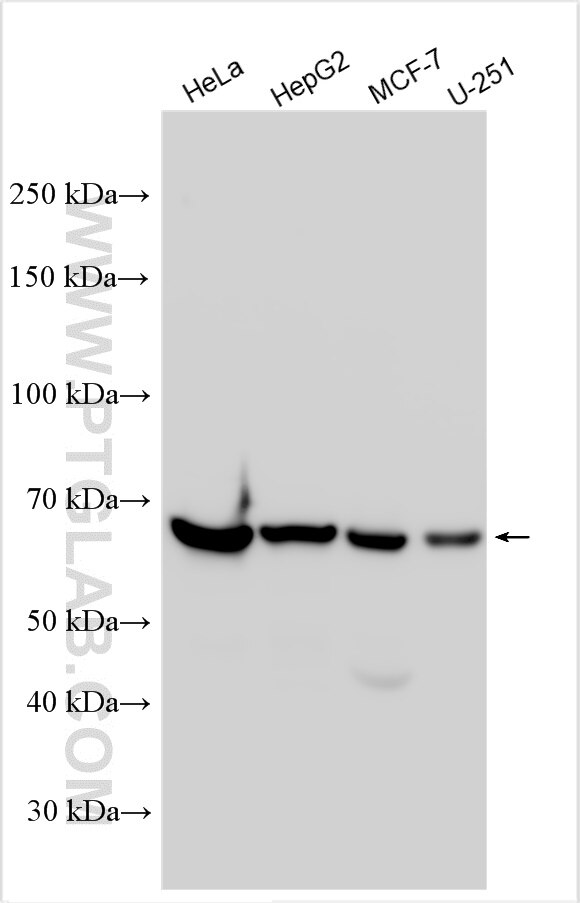Tested Applications
| Positive WB detected in | HeLa cells, HepG2 cells, MCF-7 cells, U-251 cells |
Recommended dilution
| Application | Dilution |
|---|---|
| Western Blot (WB) | WB : 1:500-1:2000 |
| It is recommended that this reagent should be titrated in each testing system to obtain optimal results. | |
| Sample-dependent, Check data in validation data gallery. | |
Product Information
13819-1-AP targets TKTL1 in WB, ELISA applications and shows reactivity with human samples.
| Tested Reactivity | human |
| Host / Isotype | Rabbit / IgG |
| Class | Polyclonal |
| Type | Antibody |
| Immunogen |
CatNo: Ag4913 Product name: Recombinant human TKTL1 protein Source: e coli.-derived, PGEX-4T Tag: GST Domain: 1-300 aa of BC025382 Sequence: MADAEARAEFPEEARPDRGTLQVFQDMASRLRIHSIRATCSTSSGHPTSCSSSSEIMSVLFFYIMRYKQSDPENPDNDRFVLAKRLSFVDVATGWLGQGLGVACGMAYTGKYFDRASYRVFCLMSDGESSEGSVWEAMAFASYYSLDNLVATFDVNRLGHSGALPAEHCINIYQRRCEAFGWNTYVVDGRDVEALCQVFWQASQVKHKPTAVVAKTFKGRGTPSIEDAESWHAKPMPRERADAIIKLIESQIQTSRNLDPQPPIEDSPEVNITDVRMTSPPDYRVGDKIATRKACGLALA Predict reactive species |
| Full Name | transketolase-like 1 |
| Calculated Molecular Weight | 65 kDa |
| Observed Molecular Weight | 65 kDa |
| GenBank Accession Number | BC025382 |
| Gene Symbol | TKTL1 |
| Gene ID (NCBI) | 8277 |
| RRID | AB_3085424 |
| Conjugate | Unconjugated |
| Form | Liquid |
| Purification Method | Antigen affinity purification |
| UNIPROT ID | P51854 |
| Storage Buffer | PBS with 0.02% sodium azide and 50% glycerol, pH 7.3. |
| Storage Conditions | Store at -20°C. Stable for one year after shipment. Aliquoting is unnecessary for -20oC storage. 20ul sizes contain 0.1% BSA. |
Background Information
Transketolase (TKT) is an enzyme that is ubiquitously expressed in all living organisms and has been identified as an important regulator of cancer. The TKT family includes the TKT gene and two TKT-like (TKTL) genes; TKTL1 and TKTL2.The basic components ribose-5-phosphate and acetyl-CoA, which are formed by TKTL1, provide essential building blocks for the formation of new cells. TKTL1 also allows survival in the absence of oxygen (hypoxia).TKTL1 also has been shown to be involved in regulating neuronal development in the cerebral cortex.
Protocols
| Product Specific Protocols | |
|---|---|
| WB protocol for TKTL1 antibody 13819-1-AP | Download protocol |
| Standard Protocols | |
|---|---|
| Click here to view our Standard Protocols |




